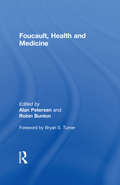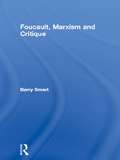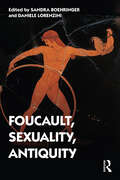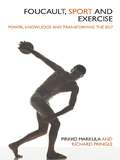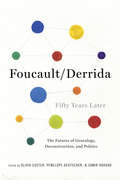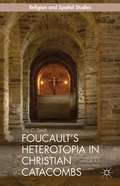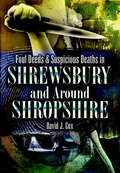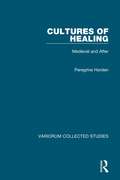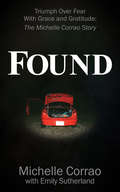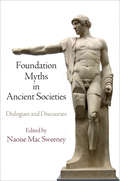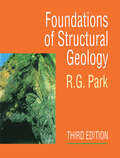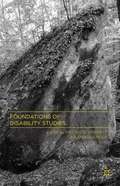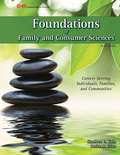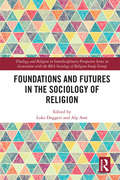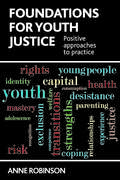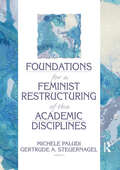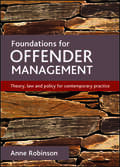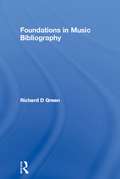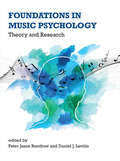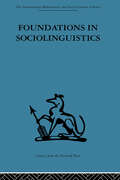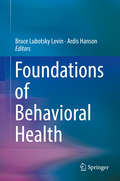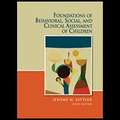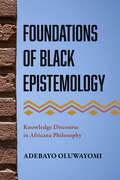- Table View
- List View
Foucault, Health and Medicine
by Alan Petersen Robin BuntonThe reception of Michel Foucault's work in the social sciences and humanities has been phenomenal. Foucault's concepts and methodology have encouraged new approaches to old problems and opened up new lines of enquiry. This book assesses the contribution of Foucault's work to research and thinking in the area of health and medicine, and shows how key researchers in the sociology of health and illness are currently engaging with his ideas. Foucault, Health and Medicine explores such important issues as: Foucault's concept of 'discourse', the critique of the 'medicalization' thesis, the analysis of the body and the self, Foucault's concept of 'bio-power' in the analysis of health education, the implications of Foucault's ideas for feminist research on embodiment and gendered subjectivities, the application of Foucault's notion of governmentality to the analysis of health policy, health promotion, and the consumption of health. Foucault, Health and Medicine offers a `state of the art' overview of Foucaldian scholarship in the area of health and medicine. It will provide a key reference for both students and researchers working in the areas of medical sociology, health policy, health promotion and feminist studies.
Foucault, Marxism and Critique (Routledge Library Editions: Michel Foucault)
by Barry SmartIn this work, originally released in 1983, Barry Smart examines the relevance of Foucault's work for developing an understanding of those issues which lie beyond the limits of Marxist theory and analysis - issues such as 'individualising' forms of power, power-knowledge relations, the rise of 'the social', and the associated socialisation of politics. He argues that there exist clear and substantial differences between Foucault's genealogical analysis and that of Marxist theory. Smart thus presents Foucault's work as a new form of critical theory, whose object is a critical analysis of rationalities, and of how relations of power are rationalised.
Foucault, Sexuality, Antiquity
by Sandra BoehringerFoucault, Sexuality, Antiquity, published for the first time in English, takes an interdisciplinary approach to exploring how the work of Michel Foucault has influenced studies of ancient Greece and Rome. Foucault’s The History of Sexuality has had a profound and lasting impact across the humanities and social sciences. In the two volumes dedicated to pagan antiquity, Foucault provided scholars with new questions for addressing ancient Greek and Roman societies, and an original epistemological framework for thinking about eroticism and about the processes by which individuals are led to recognize themselves as the subjects of their desires. Now, decades later, the scholars in this volume explore Foucault’s role in shaping and reorienting discussions of antiquity in the fields of philosophy, gender studies, and psychoanalysis, among others. A multidisciplinary exploration of Foucault’s work and its relationship to our understanding of ancient Greco-Roman societies, Foucault, Sexuality, Antiquity will be of interest to students and scholars in classical studies, philosophy, gender studies, and ancient history.
Foucault, Sport and Exercise: Power, Knowledge and Transforming the Self
by Richard Pringle Pirkko Markula-DenisonMichel Foucault’s work profoundly influences the way we think about society, in particular how we understand social power, the self, and the body. This book gives an innovative and entirely new analysis of is later works making it a one-stop guide for students, exploring how Foucauldian theory can inform our understanding of the body, domination, identity and freedom as experienced through sport and exercise. Divided into three themed parts, this book considers: Foucault’s ideas and key debates Foucault’s theories to explore power relations, the body, identity and the construction of social practices in sport and exercise how individuals make sense of the social forces surrounding them, considering physical activity, fitness and sport practices as expressions of freedom and sites for social change. Accessible and clear, including useful case studies helping to bring the theory to real-life, Foucault, Sport and Exercise considers cultures and experiences in sports, exercise and fitness, coaching and health promotion. In addition to presenting established Foucauldian perspectives and debates, this text also provides innovative discussion of how Foucault’s later work can inform the study and understanding of sport and the physically active body.
Foucault/Derrida Fifty Years Later: The Futures of Genealogy, Deconstruction, and Politics (New Directions in Critical Theory #12)
by Penelope Custer Olivia Deutscher Haddad SamirEarly in their careers, Michel Foucault and Jacques Derrida argued over madness, reason, and history in an exchange that profoundly influenced continental philosophy and critical theory. In this collection, Amy Allen, Geoffrey Bennington, Lynne Huffer, Colin Koopman, Pierre Macherey, Michael Naas, and Judith Revel, among others, trace this exchange in debates over the possibilities of genealogy and deconstruction, immanent and transcendent approaches to philosophy, and the practical and theoretical role of the archive.
Foucault’s Heterotopia in Christian Catacombs
by Eric C. SmithRinging the city like pearls on a necklace and plunging beneath the earth into darkness, the Christian catacombs of Rome have inspired and captivated people for centuries. This book takes a new approach to the study of the catacombs, using spatial theory to understand the way the catacombs were constructed, decorated, and used. Relying on the theoretical work of Michel Foucault and Henri Lefebvre, this book moves beyond traditional forms of analysis to turn a new lens to the work of understanding these monuments of early Christianity. The location and form of the Callistus Catacomb, the art found inside, the texts referenced in that art, and the community practices performed and referenced deep underground form the heart of this innovative take on the grand burial sites of the early church.
Foul Deeds & Suspicious Deaths in Shrewsbury and Around Shropshire (Foul Deeds & Suspicious Deaths)
by David J. CoxSixteen true crime cases with a connection to two West Midlands English towns from the Middle Ages to the early decades of the twentieth century. Criminal cases give us a fascinating, often harrowing insight into crime and the criminal mind, into policing methods and the justice system. They also tell us much about social conditions and attitudes in the past. And such cases make absorbing reading. David Cox&’s graphic account of 16 notorious cases in Shrewsbury and around Shropshire is a particularly strong and revealing study of this kind. Using newspaper reports, census returns, and court records, he reconstructs each case in vivid detail. At the same time, he looks into the background of the crimes and into the lives of the criminals, and he describes the methods of detection and the punishments that were imposed. The cases he&’s chosen range in date from the medieval period to the twentieth century. Included are the case of the forger who had his ear nailed to a post, the father who killed his infant son with vitriol, the transportation of a seventy-year-old woman, the murder of an inmate in a lunatic asylum, a twentieth-century highway robber and a VC winner involved in bigamy. The personal dramas David Cox explores in this book will be compelling reading for anyone who is interested in the sinister side of human nature and human weakness.Criminal cases give us a fascinating, often harrowing insight into crime and the criminal mind, into policing methods and the justice system. They also tell us much about social conditions and attitudes in the past. And such cases make absorbing reading. David Cox's graphic account of 16 notorious cases in Shrewsbury and around Shropshire is a particularly strong and revealing study of this kind. Using newspaper reports, census returns and court records, he reconstructs each case in vivid detail. At the same time he looks into the background of the crimes and into the lives of the criminals, and he describes the methods of detection and the punishments that were imposed. The cases he's chosen range in date from the medieval period to the twentieth century. Included are the case of the forger who had his ear nailed to a post, the father who killed his infant son with vitriol, the transportation of a 70-year-old woman, the murder of an inmate in a lunatic asylum, a twentieth-century highway robber and a VC winner involved in bigamy. The personal dramas David Cox explores in this book will be compelling reading for anyone who is interested in the sinister side of human nature and human weakness.
Found Footage Horror Films: A Cognitive Approach (Routledge Advances in Film Studies)
by Peter TurnerThis book adopts a cognitive theoretical framework in order to address the mental processes that are elicited and triggered by found footage horror films. Through analysis of key films, the book explores the effects that the diegetic camera technique used in such films can have on the cognition of viewers. It further examines the way in which mediated realism is constructed in the films in order to attempt to make audiences either (mis)read the footage as non-fiction, or more commonly to imagine that the footage is non-fiction. Films studied include The Blair Witch Project, Rec, Paranormal Activity, Exhibit A, Cloverfield, Man Bites Dog, The Last Horror Movie, Noroi: The Curse, Autohead and Zero Day This book will be of key interest to Film Studies scholars with research interests in horror and genre studies, cognitive studies of the moving image, and those with interests in narration, realism and mimesis. It is an essential read for students undertaking courses with a focus on film theory, particularly those interested specifically in horror films and cognitive film theory.
Found: Triumph Over Fear With Grace and Gratitude: The Michelle Corrao Story
by Emily Sutherland Michelle CorraoAn Indiana woman shares the story of her abduction, assault, faith, and survival in this inspiring autobiography.Though her name was not divulged, viewers would learn that she was hit over the head near the entrance of her home, abducted, sexually assaulted, and forced into the trunk of her own car. News cameras would capture footage of Michelle’s personal items strewn across the lawn around her home and along the wooded area behind a local restaurant. The community would breathe a sigh of relief after learning that she had somehow survived and that the assailants had been caught, ending a string of similar crimes. But there is so much more to the story.The events of September 12, 1996 would change the entire course of Michelle’s life. In the days that followed, she couldn’t imagine how she could ever live a normal, happy life and she certainly never wanted to talk about it. Found is the story of how her life was forever impacted by the compassionate heroism of an off-duty police officer, the patient and powerful love of her greatest ally, and the answer to a desperate prayer during what she believed were her dying moments. Within Found, Michelle shares this story with immense gratitude for every little miracle that would happen along the way and empower her to become a voice for others who need to know they, too, can survive whatever unexpected turns life may bring.Praise for Found“A woman of great faith faces the most difficult situation anyone can face, including impending loss of life, and is saved by a miraculous intervention. . . . Michelle Corrao’s story is a compelling story of faith, courage, and resilience.” —Neil Moore, ED.D., Fort Wayne Chief of Police (Ret.) FBI-LEEDA“Found is a powerful testimony by a courageous woman who has turned pain into power through an unimaginable ordeal. Michelle Corrao’s story will encourage anyone who has been victimized, robbed of hope, and facing death. She is an incredible role model for survivors who are determined to not simply survive but go on to thrive through helping other survivors.” —Casey Gwinn, President, Alliance for Hope International
Foundation Course - I: F.Y.B.A./ B.Com./ B.Sc.(Semester-I)
by Mahesh Bhagwat P. G. Shinde Namita Nimbalkar Meghna Shinde ChakneThe book intends to enable First Year students to learn and understand some of the important topics, such as an overview of Indian society, concept of: Disparity arising out of gender , caste system and inter-group conflicts, communalism, regionalism, linguistic differences etc.
Foundation Myths and Politics in Ancient Ionia
by Naoíse Mac SweeneyThis book examines foundation myths told about the Ionian cities during the archaic and classical periods. It uses these myths to explore the complex and changing ways in which civic identity was constructed in Ionia, relating this to the wider discourses about ethnicity and cultural difference that were current in the Greek world at this time. The Ionian cities seem to have rejected oppositional models of cultural difference which set in contrast East and West, Europe and Asia, Greek and Barbarian, opting instead for a more fluid and nuanced perspective on ethnic and cultural distinctions. The conclusions of this book have far-reaching implications for our understanding of Ionia, but also challenge current models of Greek ethnicity and identity, suggesting that there was a more diverse conception of Greekness in antiquity than has often been assumed.
Foundation Myths in Ancient Societies: Dialogues and Discourses
by Naoíse Mac SweeneyThroughout the ancient world, origin stories were told across the ancient world in many different ways: through poetry, prose, monumental and decorative arts, and performance in civic and religious rituals. Foundation myths, particularly those about the beginnings of cities and societies, played an important role in the dynamics of identity construction and in the negotiation of diplomatic relationships between communities. Yet many ancient communities had not one but several foundation myths, offering alternative visions and interpretations of their collective origins.Seeking to explain this plurality, Foundation Myths in Ancient Societies explores origin stories from a range of classical and ancient societies, covering both a broad chronological span (from Greek colonies to the high Roman empire) and a wide geographical area (from the central Mediterranean to central Asia). Contributors explore the reasons several different, sometimes contradictory myths might coexist or even coevolve. Collectively, the chapters suggest that the ambiguity and dissonance of multiple foundation myths can sometimes be more meaningful than a single coherent origin narrative. Foundation Myths in Ancient Societies argues for a both/and approach to foundation myths, laying a framework for understanding them in dialogue with each other and within a wider mythic context, as part of a wider discourse of origins.Contributors: Lieve Donnellan, Alfred Hirt, Naoíse Mac Sweeney, Rachel Mairs, Irad Malkin, Daniel Ogden, Robin Osborne, Michael Squire, Susanne Turner.
Foundation of Structural Geology
by R G ParkSince the first edition was published in 1983, this highly-regarded introductory textbook has been used by many generations of students worldwide. It is specifically tailored to the requirements of first or second year geology undergraduates.The third edition has been extensively revised and updated to include many new sections and over 50 new or redrawn illustrations. There are now over 220 illustrations, many incorporating a second colour to highlight essential features. The format has been changed to enhance the visual attractiveness of the book.The tripartite organization of the first and second editions has been modified by combining the purely descriptive or factual aspects of fault and fold structure in the earlier chapters with a simple treatment of mechanisms, leaving the more geometrically complex treatment until after the relevant sections on stress and strain, as before. Some subjects are introduced for the first time, e.g. inversion and orogen collapse, and others have been extensively modified, e.g. the chapter on gravity controlled structures now emphasises modern work on salt tectonics. The last third of the book is devoted to the wider context of geological structures and how they relate to plate tectonics. The final two chapters have been considerably expanded and give examples of various types of geological structures in their plate tectonic settings in both modern and ancient orogenic belts.
Foundations Of Disability Studies
by Matthew Wappett Katrina ArndtA collection of eight essays by scholars who have published extensively within the disability studies literature, and who have helped build the field to its current state. Includes contributions from Robert Bogdan, Doug Biklen, Susan Schweik, and more.
Foundations Of Family And Consumer Sciences: Careers Serving Individuals, Families, And Communities
by Sharleen L. Kato Janice G. EliasFoundations of Family and Consumer Sciences a completely updated college-level textbook designed to introduce students to the Family and Consumer Sciences profession. An overview of the profession, including history and trends, is presented. Career opportunities for each Family and Consumer Sciences specialization area are explored and come to life in Professional Profiles and Issues in the News features. The text guides students in how to move into the workplace and make a difference in the lives of others.
Foundations and Futures in the Sociology of Religion (Theology and Religion in Interdisciplinary Perspective Series in Association with the BSA Sociology of Religion Study Group)
by Luke Doggett Alp AratSince the sociology of religion became recognised as a distinct sub-discipline over the last century, the dominance of approaches taking their inspiration from the sociological classics has increasingly been challenged. Empirical findings have brought the notion of secularisation into question; and theorists have sought to deconstruct how we think of ‘religion.’ This collection appraises the continuing influence of the foundational approaches and places these in relation to newly emerging directions in the field. The book is divided into four sections, each section containing one ‘foundational’ chapter written by an established academic followed by two ‘futures’ chapters contributed by emerging scholars in the sub-discipline. These chapters complement one another by placing the overview of future directions in the context of a survey of the development of the sociology of religion over the last century. Topics discussed in these chapters include lived religion, sexuality, ritual, religion and the media. Combining erudite examinations of the British Sociological Association Sociology of Religion Study Group’s work so far with explorations of the future directions its research might take, this book is vital reading for any scholar whose work combines religious studies and sociology.
Foundations for Youth Justice: Positive Approaches to Practice
by Anne RobinsonHow can youth justice refocus its attentions on the rights and perspectives of young people in transition? This exciting new book outlines the state of practice now in flux within structures created by New Labour but moving in a different direction under the Coalition Government. With a loosening of rules and prescription, it explores opportunities for a fresh orientation that places young people at the centre and works collaboratively to nurture strengths, competences and capital. The chapters build a picture of the risks and problems that modern society creates for young people, while acknowledging that society must respond when their behaviours legitimately cause risks and problems for others. The burning question is how we do so and this book proposes a critical perspective that leads into a bold, but realistic remodelling of practice. It will be ideal for students of youth justice and criminal justice on foundation, post-qualifying or professional (CPD) courses.
Foundations for a Feminist Restructuring of the Academic Disciplines
by Ellen Cole Esther D Rothblum Michele Paludi Gertrude A SteuernagelHere is a useful and illustrative guide for those interested in the impact of feminist scholarship on traditional academic disciplines. This important book explores the changes that have taken place in the academic world as a result of feminist approaches to scholarship, including issues of staffing, organization, administration, recruitment, stude
Foundations for offender management: Theory, law and policy for contemporary practice
by Anne Robinson'Offender management' for probation means continuing commitment to constructive work with individuals who break the law but in a changing multi-agency context. Providing a comprehensive introduction to criminal justice work, this book negotiates the structures set by law and policy and allows readers to think critically about roles, accountabilities and professional skills and judgement. Looking at key areas of practice and law, including youth justice, human rights and safeguarding children, the book will be essential for students and practitioners in criminal justice and probation studies.
Foundations in Music Bibliography
by Richard D GreenAs more and more music literature is published each year, librarians, scholars, and bibliographers are turning to music bibliography to retain control over the flood of information. Based on the Conference of Music Bibliography, this timely book provides vital information on the most important aspects of the scholarly practice of music bibliography. Foundations in Music Bibliography provides librarians with great insight into bibliographic issues they face every day including bibliographic control of primary and secondary sources, the emergence of enumerative and analytical bibliography, bibliographic instruction, and bibliographic lacunae.Foundations in Music Bibliography features the perspectives of prominent scholars and music librarians on contemporary issues in music bibliography often encountered by music librarians. It offers practical insights and includes chapters on teaching students how to use microcomputer programs to search music bibliographies, organizing a graduate course in music bibliography, and researching film music bibliography. The book also provides a supplement to Steven D. Westcott’s A Comprehensive Bibliography of Music for Film and Television. This insightful volume demonstrates the many ways that bibliography relates music publications to each other and endows grander meaning to individual scholarly observations. Some of the fascinating topics covered by Foundations in Music Bibliography include: the history of thematic catalogs indexing Gregorian chant manuscripts general principles of bibliographic instruction analyses of Debussy discographies musical ephemera and their importance in various types of musicological research bibliographical lacunae (i.e. lack of access to visual sources, failure to control primary sources, and lack of communication with the rest of the performing arts)Foundations in Music Bibliography shows librarians how bibliography can be used to help music students and researchers find the information they need among the innumerable available sources. It is an indispensable asset to the shelves of all music reference libraries that wish to provide their patrons with the latest bibliographic tools.
Foundations in Music Psychology: Theory and Research (The\mit Press Ser.)
by Daniel J. Levitin Peter Jason RentfrowA state-of-the-art overview of the latest theory and research in music psychology, written by leaders in the field.This authoritative, landmark volume offers a comprehensive state-of-the-art overview of the latest theory and research in music perception and cognition. Eminent scholars from a range of disciplines, employing a variety of methodologies, describe important findings from core areas of the field, including music cognition, the neuroscience of music, musical performance, and music therapy. The book can be used as a textbook for courses in music cognition, auditory perception, science of music, psychology of music, philosophy of music, and music therapy, and as a reference for researchers, teachers, and musicians. The book's sections cover music perception; music cognition; music, neurobiology, and evolution; musical training, ability, and performance; and musical experience in everyday life. Chapters treat such topics as pitch, rhythm, and timbre; musical expectancy, musicality, musical disorders, and absolute pitch; brain processes involved in music perception, cross-species studies of music cognition, and music across cultures; improvisation, the assessment of musical ability, and singing; and music and emotions, musical preferences, and music therapy.ContributorsFleur Bouwer, Peter Cariani, Laura K. Cirelli, Annabel J. Cohen, Lola L. Cuddy, Shannon de L'Etoile, Jessica A. Grahn, David M. Greenberg, Bruno Gingras, Henkjan Honing, Lorna S. Jakobson, Ji Chul Kim, Stefan Koelsch, Edward W. Large, Miriam Lense, Daniel Levitin, Charles J. Limb, Psyche Loui, Stephen McAdams, Lucy M. McGarry, Malinda J. McPherson, Andrew J. Oxenham, Caroline Palmer, Aniruddh Patel, Eve-Marie Quintin, Peter Jason Rentfrow, Edward Roth, Frank A. Russo, Rebecca Scheurich, Kai Siedenburg, Avital Sternin, Yanan Sun, William F. Thompson, Renee Timmers, Mark Jude Tramo, Sandra E. Trehub, Michael W. Weiss, Marcel Zentner
Foundations in Sociolinguistics: An ethnographic approach (Conduct And Communication Ser.)
by Dell HymesTavistock Press was established as a co-operative venture between the Tavistock Institute and Routledge & Kegan Paul (RKP) in the 1950s to produce a series of major contributions across the social sciences. This volume is part of a 2001 reissue of a selection of those important works which have since gone out of print, or are difficult to locate. Published by Routledge, 112 volumes in total are being brought together under the name The International Behavioural and Social Sciences Library: Classics from the Tavistock Press. Reproduced here in facsimile, this volume was originally published in 1977 and is available individually. The collection is also available in a number of themed mini-sets of between 5 and 13 volumes, or as a complete collection.
Foundations of Behavioral Health
by Bruce Lubotsky Levin Ardis HansonThis comprehensive book examines the organization, financing, delivery, and outcomes of behavioral health (i.e., alcohol, drug abuse, and mental health) services from both U.S. and global perspectives. Addressing the need for more integrative and collaborative approaches in public health and behavioral health initiatives, the book covers the fundamental issues in behavioral health, including epidemiology, insurance and financing, health inequities, implementation sciences, lifespan issues, cultural responsiveness, and policy.Featuring insightful research from scholars in an interdisciplinary range of academic and professional fields, chapters fall into three distinct sections:Overview: Outlines the defining characteristics of behavioral health services and identifies significant challenges in the fieldAt-Risk Populations: Explores critical issues for at-risk populations in need of behavioral health services, including children in school environments, youth in juvenile justice systems, and persons with developmental disabilities, among othersServices Delivery: Presents a rationale for greater integration of health and behavioral health services, and contextualizes this explanation within global trends in behavioral health policy, systems, and servicesAn in-depth textbook for graduate students studying public health, behavioral health, social work policy, and medical sociology, as well as a useful reference for behavioral health professionals and policy makers, Foundations of Behavioral Health provides a global perspective for practice and policy in behavioral health. It promotes better understanding of the importance of integrating population health and behavioral health services, with an eye towards improving and sustaining public health and behavioral health from national, regional, and global perspectives.
Foundations of Behavioral, Social, and Clinical Assessment of Children: Sixth Edition
by Jerome M. SattlerThe Sixth Edition of Foundations of Behavioral, Social, and Clinical Assessment of Children, which also includes the Resource Guide to Accompany Foundations of Behavioral, Social, and Clinical Assessment of Children, Sixth Edition
Foundations of Black Epistemology: Knowledge Discourse in Africana Philosophy
by Adebayo OluwayomiFoundations of Black Epistemology is Adebayo Oluwayomi’s bold endeavor to delineate Black epistemology as a new sub-disciplinary focus in contemporary Africana or Black philosophy. He engages in a rigorous historical study of Black intellectual history to show how seminal Black thinkers have long been interested in and engaged with questions concerning the phenomenon of human knowledge, and questions around human agency, including practical considerations regarding the social and political value of knowledge. Foundations of Black Epistemology examines writings by Phillis Wheatley, Frederick Douglas, Ida B. Wells, W.E.B. DuBois, Frantz Fanon, Steve Bantu Biko, Huey P. Newtown, and Kathleen Neal Clever. Each chapter addresses issues of self-knowledge, self-assertion, Black consciousness, or anticolonialism and its relation to personal and political epistemologies. Oluwayomi offers innovative perspectives on the formulation, deduction, and interrogation of epistemological themes within Black Africana philosophy. By considering the important epistemological theories and arguments in Black philosophy particularly in the last 150 to 200 years, Foundations of Black Epistemology promises to generate new discussions around this necessary field of Black Africana philosophy.
